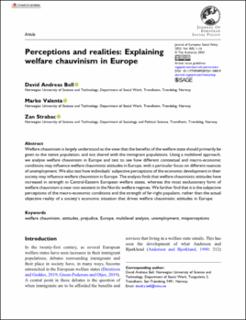Perceptions and realities: Explaining welfare chauvinism in Europe
Peer reviewed, Journal article
Published version
Permanent lenke
https://hdl.handle.net/11250/3060243Utgivelsesdato
2023Metadata
Vis full innførselSamlinger
Originalversjon
10.1177/09589287231158019Sammendrag
Welfare chauvinism is largely understood as the view that the benefits of the welfare state should primarily be given to the native population, and not shared with the immigrant populations. Using a multilevel approach, we analyse welfare chauvinism in Europe and test to see how different contextual and macro-economic conditions may influence welfare chauvinistic attitudes in Europe, with a particular focus on different nuances of unemployment. We also test how individuals’ subjective perceptions of the economic development in their society may influence welfare chauvinism in Europe. The analysis finds that welfare chauvinistic attitudes have increased in strength in Central-Eastern European welfare states, whereas the most exclusionary form of welfare chauvinism is near non-existent in the Nordic welfare regimes. We further find that it is the subjective perceptions of the macro-economic conditions and the strength of far-right populism, rather than the actual objective reality of a society’s economic situation that drives welfare chauvinistic attitudes in Europe.

